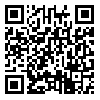BibTeX | RIS | EndNote | Medlars | ProCite | Reference Manager | RefWorks
Send citation to:
URL: http://jccnc.iums.ac.ir/article-1-126-en.html

 , Mahnaz Seyedoshohadaee2
, Mahnaz Seyedoshohadaee2 
 , Agha Fatemeh Hosseini1
, Agha Fatemeh Hosseini1 
 , Marzieh Shamsi3
, Marzieh Shamsi3 
 , Narges Bahiraei *4
, Narges Bahiraei *4 

2- Department of Biostatistics, School of Public Health, Iran University of Medical Sciences, Tehran, Iran.
3- Department of Rehabilitation Nursing, School of Nursing and Midwifery, Iran University of Medical Sciences, Tehran, Iran.
4- Department of Medical Surgical Nursing, School of Nursing and Midwifery, Iran University of Medical Sciences, Tehran, Iran. ,
Background: People with chronic diseases, including epilepsy, need to learn self-management behaviors so as to control their disease and reduce its complications. The present study aims to determine how people with epilepsy self-manage the disease.
Methods: The present research was a descriptive-correlational study conducted on 100 patients with epilepsy who had been referred to the Iranian Epilepsy Association in Tehran in January 2016 and met the inclusion criteria. The research tools included the disease profile form, demographic questionnaire, and self-management behaviors questionnaire for people with epilepsy. Statistical calculations were performed using SPSS software version 22.
Results: It was found that 85.6% of the subjects had low self-management and 14.4% had moderate to high self-management. Independent t-test showed a significant relationship between self-management and marital status (P < 0.05). There was no significant difference between total self-management score and other cognitive characteristics (P > 0.05). A negative and significant relationship was observed between age and self-management (P < 0.05). There was no significant difference between total self-management score and other cognitive characteristics (P > 0.05).
Conclusion: The findings indicate that educational interventions should be conducted to meet the educational needs of people with epilepsy in future studies.
Received: 2016/11/15 | Accepted: 2017/02/27 | Published: 2017/05/1
| Rights and permissions | |
 |
This work is licensed under a Creative Commons Attribution-NonCommercial 4.0 International License. |



